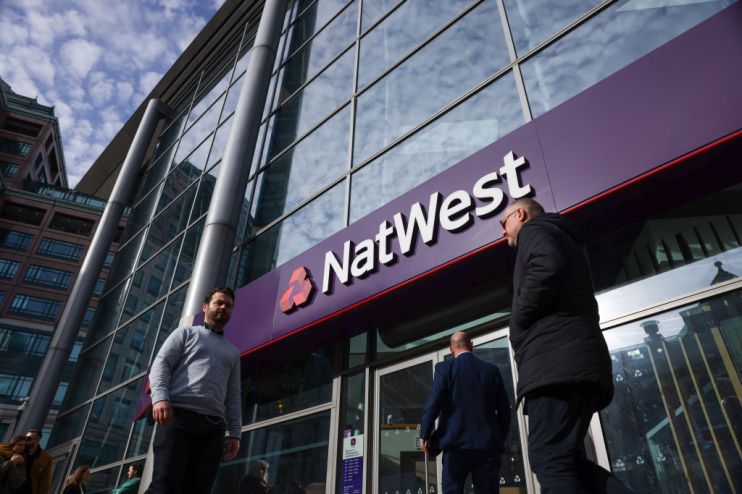Spring Budget 2024: Hunt plans Natwest government share sale this summer as Farage says debanking row ‘far from over’

Chancellor Jeremy Hunt has outlined plans for the government to begin selling part of its stake in Natwest to the general public “at the earliest opportunity” this summer, as part of wider efforts to boost stock market investment.
Meanwhile, former Ukip leader Nigel Farage has suggested that a “debanking” row and planned legal action stemming from the closure of his Coutts account last summer could deter retail investors.
In his Spring Budget on Wednesday, Hunt said the Treasury wanted to “create opportunities for a new generation of retail investors to engage with public markets”.
He added: “So we will proceed with a retail sale for part of the government’s remaining Natwest shares this summer at the earliest opportunity, subject to supportive market conditions and value for money.”
Holger Vieten, a director at UK Government Investments who is leading the Natwest retail plan, told MPs last month that “the very earliest” the retail offer could begin was June.
It remains to be announced how much the government is looking to raise from the sale. Shares are expected to be priced at a discount to make them more appealing.
The Treasury confirmed after Hunt’s speech that the retail offer would allow individual investors to buy Natwest shares from the government, either directly, such as an online application, or through “financial intermediaries with whom they have an account”.
It intends for “a broad range” of UK adult investors to be eligible for the offer.
Hunt announced last November that the Treasury would explore a retail offer within the next 12 months, referencing the “Tell Sid” campaign advertising the government’s sale of its British Gas shares under Margaret Thatcher.
The Treasury is working with advisers including advertising agency M&C Saatchi, law firm Freshfields Bruckhaus Deringer, Barclays and Goldman Sachs. Brokers Hargreaves Lansdown and AJ Bell have reportedly been approached to help market the shares.
The sale plan comes alongside wider reforms to boost UK capital markets activity. Hunt has announced a new “British Isa” and launched a consultation on a system for UK private firms to have their shares traded on exchanges.
“A retail sale could not only help achieve the goal of exiting the Natwest shareholding, but also help support wider government priorities on our ambitious financial services agenda, including promoting retail investing and the UK’s capital markets,” the Treasury said on Wednesday.
The government currently holds a stake of around 32 per cent in Natwest, worth some £7.1bn. Its stake will shrink before the retail sale begins, with the Treasury offloading small numbers of shares to institutional investors nearly every day under its “trading plan”.
Natwest is also able to make deals with the Treasury to buy back its shares. The bank has done this three times since 2021 and is next eligible to make a deal in May.
The government took an 84 per cent stake in the lender, then known as Royal Bank of Scotland, for an average price of 502p per share to rescue it during the financial crisis in 2008.
Taxpayers paid £45.5bn for the bailout but have lost out as Natwest’s share price has halved since then. The Treasury has recouped around £14.5bn from its share sales so far.
After a difficult year marked by a row with Brexiteer Farage over the closure of his Coutts account, which he claimed was due to his political views, the stock received a boost last month after Natwest posted its biggest annual profit since 2007 on the back of higher interest rates.
Natwest shares have risen 1.7 per cent to 254p on Budget day, with the stock at its highest level since last July and paring losses stemming from the “debanking” scandal.
However, Farage told Sky News on Wednesday that his row with Natwest, which triggered the resignation of chief executive Dame Alison Rose last July, was “far from over”.
“They acted in a politically prejudiced way against me and then deliberately tried to cover it up,” he said. “Until they provide full disclosure and apologise for their behaviour, why should any retail customer trust them?”
An independent review by law firm Travers Smith found in December that account closures at Coutts were in line with industry standards and showed “no evidence of discrimination due to political views”, but flagged “deficiencies” in its communication on the issue.
The last time the government launched a similar retail offer was with Royal Mail shares in 2013, luring some 700,000 investors.
It made plans to offer its shares in Lloyds Banking Group in 2015 but pulled out the following year before fully offloading its stake in 2017.
The Treasury plans to fully privatise Natwest by 2026.
Susannah Streeter, head of money and markets at Hargreaves Lansdown, said: “Prospects are looking up for the bank after a tumultuous year when it lost both its CEO and chair, and the valuation has been under some pressure ever since.
“But with an attractive entry point, some easing headwinds and strong capital levels, the bank’s current situation is likely to spark enthusiasm.”
A Natwest spokesperson commented: “Any decisions around share sales are a matter for the government. We welcome the continued commitment to returning Natwest Group to private ownership; this is a shared ambition and we believe it is in the best interests of the bank and our shareholders.”
Updates throughout